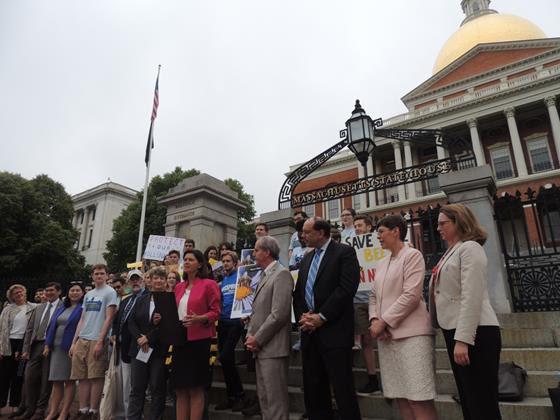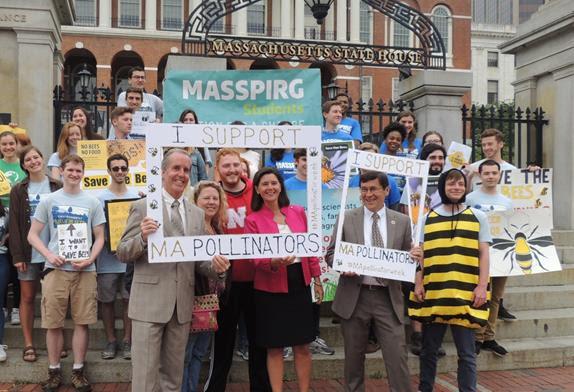Rep. Dykema Celebrates Massachusetts Pollinator Week with Students and Colleagues

(L to R) Melissa Hoffer, Rep. Jim Hawkins of Attleboro, Rep. Maria Robinson of Framingham, Brendan Geraghty of Environment Massachusetts, Cliff Youse of the Massachusetts Beekeepers Association, Deirdre Cummings of MassPIRG, Rep. Dykema, Chair Pignatelli, Sen. Eldridge, Rep. Joan Meschino of Hull, and Rep. Christine Barber of Somerville celebrate Massachusetts Pollinator Week.
Last week, Rep. Carolyn Dykema of Holliston joined Governor Charlie Baker, Attorney General Maura Healey, her colleagues in the Legislature, and local students in recognizing June 17-23 as 2019 Massachusetts Pollinator Week, a statewide and national effort to raise awareness of the vital role that bees and other pollinators play in agriculture and in the environment.
Rep. Dykema has long been a leading advocate for pollinator protection in the Legislature, first filing legislation to protect Massachusetts pollinators in 2015. She was joined by Senator Jamie Eldridge, the lead sponsor of pollinator health legislation in the Senate, Rep. Smitty Pignatelli, chair of the Joint Committee on the Environment, Natural Resources, and Agriculture, and Melissa Hoffer, Energy and Environment Bureau Chief for AG Healey at a rally organized by Environment Massachusetts and the Massachusetts Public Interest Research Group to celebrate Pollinator Week and to advocate for policies that prioritize pollinator protection.
“Bees and other pollinators play a vital role in our environment, and here in Massachusetts our main agricultural products all rely on pollination to survive,” said Rep. Dykema. “I hope everyone takes time this summer to reflect on the importance of pollinators to our ecosystem, as well as the steps we can all take to protect these keystone species for generations to come.”
This session, Rep. Dykema filed H.763, a bill that would protect pollinator health by curbing overuse of neonicotinoid pesticides, a class of pesticides associated with harmful impacts on bees. The legislation would limit use of neonicotinoids, or “neonics,” to registered and licensed professionals who have received the proper training and would direct the Department of Agricultural Resources to update training materials to include information on the risks that neonics pose to pollinators. H.763 has 153 bipartisan co-sponsors and the support of the Attorney General, as well as a diverse coalition of stakeholders that includes beekeepers, farmers, scientists, environmental advocates, and nursery growers.

Chairman Pignatelli (left), Rep. Dykema (center), and Rep. Jim Hawkins of Attleboro (right) pose with supporters of pollinator protection.
“My bill represents a common-sense approach that protects consumers from purchasing and applying a product whose impacts they may not fully understand, while at the same time recognizing the professional needs of the agriculture community,” said Rep. Dykema. “A large part of why this legislation has attracted such broad support is that the more we understand the science behind this issue, the more it is clear that this is an urgent and serious problem.”
Massachusetts is one of 49 states to recognize the third week of June as Pollinator Week each year and has done so since 2016. H.763 is currently under consideration by the Joint Committee on the Environment, Natural Resources, and Agriculture and will receive a public hearing in the fall.
Representative Carolyn Dykema represents the communities of Holliston, Hopkinton, Southborough and Precinct 2 of Westborough in the Massachusetts House of Representatives.